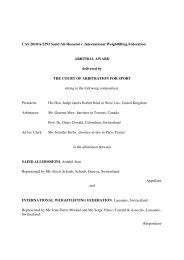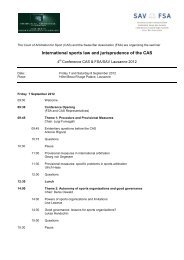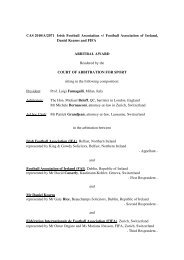(CAS) Bulletin - Tribunal Arbitral du Sport / TAS
(CAS) Bulletin - Tribunal Arbitral du Sport / TAS
(CAS) Bulletin - Tribunal Arbitral du Sport / TAS
You also want an ePaper? Increase the reach of your titles
YUMPU automatically turns print PDFs into web optimized ePapers that Google loves.
According to Article 17.4 “If any document is expressed in<br />
a language other than the language(s) of the arbitration and no<br />
translation of such document is submitted by the party relying<br />
upon the document, the <strong>Arbitral</strong> <strong>Tribunal</strong> or (if the <strong>Arbitral</strong><br />
<strong>Tribunal</strong> has not been formed) the LCIA Court may order<br />
that party to submit a translation in a form to be determined<br />
by the <strong>Arbitral</strong> <strong>Tribunal</strong> or the LCIA Curt, as the case may<br />
be”. The language of the contract is simply one factor<br />
among others for the tribunal to take into account 15 .<br />
The previous version of Article 17 LCIA Rules 16<br />
imposed that an arbitration should be con<strong>du</strong>cted<br />
in the language of the document(s) containing the<br />
arbitration agreement if the parties could not agree on<br />
any other. However, this lack of fl exibility frequently<br />
entailed unnecessary costs for the translation and<br />
interpretation of documents 17 .<br />
II. Determination of the language of the proce<strong>du</strong>re<br />
before the constitution of the panel<br />
A. Determination of the language of the<br />
proce<strong>du</strong>re by means of an order<br />
on language<br />
Usually, in cases where there is no agreement as to the<br />
language of the proce<strong>du</strong>re before <strong>CAS</strong>, the President<br />
of the – ordinary or appeals- Division of <strong>CAS</strong> issues<br />
an “ Order on language ”. Generally, the circumstances<br />
that are taken into consideration for the determination<br />
of the language of the proce<strong>du</strong>re include “the choice of<br />
the applicable law and the language of the contract, the language<br />
of other principal documents, the mother tongue of likely fact<br />
and expert witnesses and the availability of suitable arbitrators<br />
and counsel with the necessary language skills ” 18 .<br />
In most cases, the order is only meant to clarify the<br />
issue of language. However, as we can see from the<br />
indicative Figure (II) listing the orders on language<br />
at the end of this text, in some cases the President of<br />
the Division issues the order on language at the same<br />
time with an order on provisional measures 19 ; it can<br />
also resolve other matters, such as the appointment<br />
of arbitrators, if they have not been appointed by<br />
the parties (as it was the case in <strong>CAS</strong> 2005/A/1003,<br />
Order of 7 April 2006), or decide on the admissibility<br />
of the case (<strong>CAS</strong> 2006/A/1163, Order on language<br />
and admissibility of 2 November 2006).<br />
At this point we should note that the Orders on<br />
Language issued by the <strong>CAS</strong> are proce<strong>du</strong>ral orders<br />
15. See also Article 16 ICC Rules.<br />
16. Article 8,1 of the 1985 edition of the LCIA Rules.<br />
17. See Nesbitt S., op.cit., p. 433.<br />
18. See REED/PAULSSON/BLACKABY, Guide to ICSID Arbitration,<br />
Kluwer 2004, pp. 30 – 31; see also <strong>CAS</strong> 2008/O/1661, order on language<br />
issued on 13 November 2008.<br />
19. See <strong>CAS</strong> 2006/A/1155, Order on provisional measures and on the<br />
language of the proceedings of 27 September 2006.<br />
and not awards; as such, they cannot be challenged<br />
in court pursuant to Article 190 Swiss PILA (see<br />
also <strong>CAS</strong> 2009/A/1743 MP2); furthermore, they are<br />
ordered without costs 20 .<br />
B. Criteria for the determination of the<br />
language of the proce<strong>du</strong>re<br />
1. Choice of English or French in the absence of<br />
agreement between the parties<br />
In case of disagreement between the parties, Article<br />
R29 <strong>CAS</strong> Code does not provide for the possibility<br />
to the President of the panel/the President of the<br />
Ordinary or Appeals Division of <strong>CAS</strong> to choose<br />
a language other than English or French (“[the<br />
President] shall select one of these two languages as the language<br />
of the arbitration at the outset of the proce<strong>du</strong>re”). In <strong>TAS</strong><br />
2005/A/760 21 the Panel held that by inserting an<br />
arbitration clause acknowledging <strong>CAS</strong>’ jurisdiction<br />
into the statues of the federation, said federation<br />
also accepts that the <strong>CAS</strong> Code be applied 22 .<br />
Notwithstanding the clear provision of Article R29<br />
<strong>CAS</strong> Code, some parties do request the use of another<br />
language. In principle, <strong>CAS</strong> shows some fl exibility,<br />
either by granting an additional deadline in order to<br />
translate the submissions or by allowing parties to<br />
express themselves orally in both languages.<br />
In <strong>CAS</strong> 2006/A/1155 the Appellant was of Brazilian<br />
nationality and, at the time of the appeal, was<br />
registered with a Spanish football club. He appealed<br />
against a decision issued by the FIFA Appeal<br />
Committee and named FIFA as the Respondent. In<br />
the “Order on provisional measures and on the language of<br />
the proceedings” of 27 September 2006, the President<br />
of the Appeals’ Division decided on the application<br />
for a stay of the appealed decision and, on the same<br />
time, on the language of the arbitration 23 . The<br />
Appellant had requested to choose Spanish as the<br />
language of the proceedings, by arguing that Spanish<br />
is an offi cial language of FIFA and, in addition, the<br />
appealed decision was drafted in Spanish. FIFA<br />
objected by stating that Spanish was an offi cial FIFA<br />
language (according to Article 108 para. 1 FIFA<br />
Disciplinary Code, FDC), but not an offi cial <strong>CAS</strong><br />
language. Therefore, the proce<strong>du</strong>re should take place<br />
in English; moreover, the Appellant’s representative<br />
had a good command in English.<br />
The President of the Appeals’ Division concluded<br />
20. See e.g. the Order on language in <strong>TAS</strong> 2005/A/950, order of 27<br />
September 2005.<br />
21. See <strong>TAS</strong> 2005/A/760, para. 28.<br />
22. Including Article R29 providing for the two <strong>CAS</strong> working languages:<br />
see also <strong>CAS</strong> 2009/A/2014 paras. 91 f.<br />
23. See the <strong>CAS</strong> 2006/A/1155, Order on provisional measures and on<br />
the language of the proceedings of 27 September 2006, paras. 40 ff.<br />
Articles et commentaires / Articles and commentaries<br />
-<br />
42





